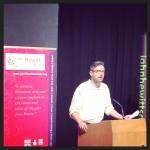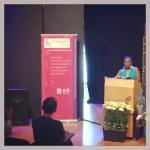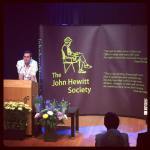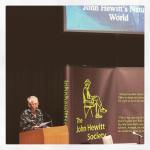Jan Carson's Blog, page 8
October 3, 2017
Postcard Stories from America 2017 – Instalment One
[image error]
27th September 2017
Clodagh Brennan Harvey
San Francisco, California
Things you cannot tell from the website: the palm trees are real and luscious; eight of them in total, fingers fringing out against a perfectly 80s sunset as they guard the parking lot pool. Yes, there will be a kidney-shaped pool in the parking lot with white, plastic sun loungers tracking its tepid edges. No one will enter this pool during the duration of your stay. No one will even acknowledge its existence though it is a comfort, and a kind of luxury, to know it is there blueing back up at the blue, California sky.
The room will smell like motel rooms in old Clint Eastwood movies and contain two double beds though there is only one of you, also a trouser press and, in the corridor outside, an ice machine mumbling to itself. The dining room will be floral, or perhaps florid would be a more accurate word, and the menu will contain mostly pale, pastel foods, easy on the gums. In the background, piped smooth jazz, piano ballads, pan pipe versions of all the Simon and Garfunkel hits. Easy listening. At the next table an elderly lady in a baseball cap will be spooning chocolate ice cream from a glass dish one-handed. Her spare hand will be reaching across the table to rest upon the hand of an elderly man wearing shorts and a fishing vest, her husband, you’ll presume.
Everyone will be significantly older than you in that particularly American way which involves white, white sneakers and yelling into cellular phones. It will be somewhere between a nursing home and a Wes Anderson movie. You couldn’t possibly have known this from the website, or the way you will not be able to contain your own glee.
28th September 2017
Georgi Gill and Lizzie Fowler
San Francisco Museum of Modern Art
There are two elderly ladies visiting the Nam June Paik exhibition at the San Francisco Museum of Modern Art, today. One is reasonably tubby. The other one is exceptionally thin. The larger of the two is being followed by a young, pony-tailed man wearing a jumper you once owned in 1996, and loved, and subsequently shrunk in a too hot wash. You think about that sweater still. It was peculiarly soft.
The old lady and the young man are joined together by a single electric cable, (connected to her ears by a pair of bucket headphones, joined to his hands by a black, gloss-look, electric guitar). He is playing the guitar. She is listening and walking round the various pieces in the exhibition, moving from one robotic sculpture to the next, stopping to smile occasionally, and place a liver-spotted hand against her headphoned ear, as if the guitar, or the boy who is playing the guitar, has just said something particularly amusing.
As the thrust of the exhibition is an exploration of Nam June Paik’s preoccupation with the devices and electronic gadgets we come to rely upon later in life, it is possible –easy even- to see the boy, the electric guitar, and the elderly woman as a kind of self-referencing installation. It is also possible that they are on some kind of really weird date. This would make the thin lady –whom you’ve all but forgotten about- a third wheel of the very worst kind.
29th September 2017
Kate Johnson
San Francisco Airport
On the way through security he angles himself to be able to see the screenshot of each passenger’s body as they pass through the X-ray machine. This is not voyeurism on his part. It is more romantic. He likes to think that he is catching a glimpse of the core of each person’s being, the only solid parts of them which will remain, centuries from now, when they are dead and gone to bone. This is how he comes to notice that the woman in the red sweater has no heart.
As she stands in the X-ray booth, open-footed, hands held aloft like a 1980s aerobic instructor, he can clearly see on the security monitor that there is a black squidge-shaped space in her chest exactly where her heart should be. He wonders if she even knows her heart is missing. Possibly not. She doesn’t look particularly sad or more perturbed than any of the other passengers hustling to make their domestic connections. He wonders if it is possible to live a perfectly adequate life- to travel and drink coffee, and read paperback novels, and even hold down a part time job- without a functioning heart. Maybe.
Maybe not. Later he spots the same red-sweatered woman at the depart gate for Chicago. An airport employee has approached her with the tiny dog they keep on hand to reassure anxious passengers. She is holding this dog too tightly against her chest, stroking its tousled hair manically, clutching it like a baby. She looks petrified, like she may never actually make Chicago. He wonders if a heart would help this red-sweater woman, or only make matters worse.
30th September 2017
Padraig O’Tuama
Salt Lake City
Midnight, Salt Lake City, you sleep and dream about your feet falling off at the ankle and wake abruptly to the sound of helicopter blades chortling overhead. You are eye blind in a dark night room with the smell of your home-washed pyjamas lilacing in your nose. And so, you think, without thinking that this is East Belfast. The feel of it. The smell of it. The sound of it stirring a hundred feet above you like some very ordinary beast. This is every other Saturday night in the East. Nothing worth waking over.
So, you stretch into the expanse of your imagined bed, knowing instinctively where the wall of it is, where the bedside table looms, and the whole thing ends. Legs scissor beneath cold duvet. Left arm lunges away from your side. But your hand does not encounter more duvet and your leg slips off the edge of the mattress and you fall on to the floorboards beside a single bed in a borrowed room in Salt Lake City.
Thankfully you are too soft and sleep thick for bruises. But you embarrass nonetheless. Overhead the helicopter blades keep stirring. You lie very still on the floor and wonder if they can see you through the ceiling. If they are laughing at you, or trying not to.
1st October 2017
Claire Mabey
Salt Lake City
The firm I work for specializes in the security and maintenance of abandoned shopping malls throughout North America. We provide cleaners, security guards and janitors to work the escalators and glass-eyed store fronts of almost a thousand ghost malls. I am a security guard. I wear a navy blue uniform and hat and am equipped with a tazering device which I wear in a special belt pocket. I have never deployed by tazer. There is no one here to taze. I have never chases a shoplifter or runaway crooks. I have never intercepted a robbery of any kind. Most days I do not even break a sweat. My wife likes this. She can get away with only laundering my uniform twice weekly.
People often ask me, where’s the job satisfaction in patrolling an abandoned space? I smile at these people and say very little. They do not understand the immense pleasure I take from seeing the floor tiles consistently unmuddied, the trash cans neat and empty, every pane of store front glass polished as water, the food court odourless and silent, the shopping carts snaking demurely in their ranks. The whole building sleek and functional without the nuisance of people.
2nd October 2017
Paula Hawkins
Powell’s Books, Portland
When I find myself in a particularly large bookstore –the sort of bookstore with aisles long and high enough to afford a little coverage- I like to walk from section to section rearranging the books so every writers finds him or herself filed next to a companionable author friend. Helen Fielding is no longer forced into awkward confab with F. Scott Fitzgerald and –perish the thought- William Faulkner. Roald Dahl has no further opportunity to make light of Doestoevsky and Graham Greene acquires a little welcome distance from Germaine Greer.
Afterwards I sit back and listen to the companionable chatter rising from the shelves. Lewis Carroll and Angela Carter discovering all the dark and devilish things they have in common. Roth and Updike, and young Franzen, raising their voices to prove just how despicable the human being can be. Faulkner finally realizing he has oh so many things to say to Virginia Woolf and, in the corner, all by himself, just listening to what they all talk about when the talk among themselves, the ever present Raymond Carver. After the bookstore has fallen silent he will write down everything he’s heard verbatim. Each individual voice will be shocked to discover he or she is much less eloquent than they’d been led to believe.


September 28, 2017
Stories for Homes 2
[image error]
Hi folks, I’m trailing round the West Coast of America doing bookish things, (mostly visiting book stores and buying books to add to the leaning tower of fiction on my bedside table), so I’ve no real idea what time it is back at home. But it’s still September 28th here and this little treat just launched this morning. You can buy it on Amazon by clicking on this link. Unfortunately, right now it’s only available as a download. I’e never actually read an Ebook, but even I might make an exception for this one. And, if enough people buy a copy, you never know, there could be a paper-based future for these wonderful stories.
Stories for Homes 2 a lovely new anthology of short stories on the theme of home. I’ve written an update on The Tiger Who Came To Tea, (which most of you know is my all time favourite children’s story, and even if it wasn’t before, it certainly is now, after reading it at storytelling sessions approximately 3 dozen times in the last month. Please do stop me if you want to hear my authentic tiger voice). The lovely editors of Stories for Homes, Debi Alper and Sallie Swingewood have been kind enough to include my TWCTT fan fiction in their anthology. I am now like that woman who isn’t Agatha Christie, but is doing new Poirot books, only Judith Kerr is still alive and might not appreciate some eejit from East Belfast, imagining what her best loved characters will be like twenty five years on. Also I am unlikely to make just as much money from my fan fiction as Sophie Hanna, (nb should have picked more lucrative source material). This will not stop me from someday soon actually following through on the Holby City/Casualty themed literary journal.
All that to say, this post really isn’t about me, or Judith Kerr, (wonderful and inspiring as she is), or even Poirot, (though you all know I’ll take any opportunity to slip him into the conversation). It’s just a wee reminder that all the profits from sales of Stories For Homes 2 will go to Shelter, and I don’t need to tell you that Shelter do incredible work. Every day they provide tangible support and advice for people who are homeless. I know they’ll put every penny of the money generated by this anthology to incredibly good use, offering people hope and support and dignity. So even if you don’t like The Tiger Who Came To Tea, (what sort of degenerates don’t like The Tiger Who Came to Tea?) or short stories, or books, or words, or me you should probably still buy a copy. It will be a better use of your money than the one and a half pumpkin spiced lattes you might otherwise use your hard-earned £5.99 on. And you never know, you might actually enjoy reading it.
[image error]


September 23, 2017
Postcards for Hannah: Installment Two
[image error]
10th September 2017
Heaney Homeplace, Bellaghy
Ciaran Carson is reading a poem about lying in the back of an ambulance, speeding through the streets of Belfast. It is early September, still warm enough for open windows. The sound of a siren –police, ambulance, fire engine- shimmers into the room. You note the detail of this and other tiny details: the red of your lipstick, blooding on the coffee cup’s lip, the sterile, white walls, and the thin lines intersecting each other on Ciaran’s tie, forming diamond shaped jewels which also remind you of siren lights, peeling frantically on ambulance roofs.
“The rear window passes by aslant,” he reads, “like deviations to the route, the slope all wrong, familiar buildings rendered strange,” and you have no personal recollections of lying back flat in an ambulance, thank God, no memory of losing the topography of your own place. Instead, you remember all those very many nights as a small child laid across the backseat in your pyjamas, travelling home from church, or grandparents, or someone’s caravan at the coast. No car seat to hold you. No belt either. Only the familiar lurch and yield of the right, right, left, left turns, and the tree branches casting leopard print shadows across the parcel shelf, to reassure you, your are almost home and safe.
12th September 2017
Tring, Hertfordshire
I have just realised that the writer Paul Auster was once married to the writer Lydia Davis. They have not been married for over thirty years now, almost as long as I have been alive. Nonetheless, I am shocked to discover this fact. I count myself something of a Paul Auster fan, having read every one of his books, aside from the latest which is still only available in hardback, and rumoured to be quite mediocre. I am therefore holding out for the paperback.
I do not enjoy the writing of Lydia Davis at all, and yet, reading between the lines of her youthful correspondence with Auster, I find myself beginning to warm to her. She is not as perfunctory as I have previously assumed. She is capable of grand gestures as well as the painstaking description of minutiae. She is occasionally quite funny. I think I might actually like Lydia Davis now.
Then, I remember that this is not Lydia Davis herself I am encountering, or even her work, but rather Lydia Davis funneled through the lens of Paul Auster’s imagination, and doesn’t he pride himself, on his unreliable narrators: deviants, neurotic detectives, New York illusionists, and sleight of hand artists, once, a dog. It is difficult to know which truth to lean upon with Auster’s writing. I remain skeptical about Lydia Davis.
18th September 2017
Dublin
On a Dublin pavement, stenciled in blue paint, “walkers are the practitioners of the city, for the city is made to be walked.” The W of walked has eroded under hundreds, if not thousands, of individual boots and shoes, but if’s easy enough to tell what the word is meant to be, and isn’t this living proof of the way the city is constantly shaping itself around the people who call it home, or pass through its rain slick streets, dropping cigarette butts, tracking puddle water, littering and refraining from the act of littering, opening and closing external doors, disturbing leaves. They are like small, sticky children leaving fingerprints on everything they touch. Without them the city would not be a city, so much as the idea of stacked bricks waiting to be more than stacked bricks.
22nd September 2017
Cathedral Quarter, Belfast
She says she’s writing a children’s book about a lonely cactus.
“He really wants to make friends,” she explains, “or possibly even fall in love, but every time he gets close to someone he hurts them so much they just leave.”
Everyone in the group falls silent. Some are thinking about cacti. Most are thinking about how the lonely cactus is a metaphor for pretty much every adult relationship they’ve ever had. They begin to suggest possible resolutions to the story. They have a vested interest in finding a happy ending for the lonely cactus.
“Could his spikes fall off?” asks one elderly man. “That was he’d be able to get close to others without hurting them.”
She doesn’t like the idea of a spikeless cactus. She thinks it might confuse her young readers. How will they recognise her protagonist as a cactus if he is bald?
“What if the lonely cactus met someone who enjoyed being hurt?” asks a young man named Simon. “And they learnt how to be happy together even though one of them was always in pain.”
She disregards this idea too, saying it does not sound like a plot suitable for a children’s book. Secretly she thinks it sounds far too much like real life.


September 3, 2017
Postcards for Hannah : Installment One
[image error]
While Hannah’s away studying in Michigan and I can’t enjoy wonderful conversations about art and things we’ve read and heard and seen, in person, over wine or coffee, I’m going to send her little Postcard Stories based on what I’m reading, watching, seeing, listening to and thinking about. It’s not the same as talking art in person but hey ho, Hannah gets some nice mail from the homeland and you lot get to read a few new Postcard Stories. I’m not a mad woman. There won’t be one of these every day, just when the notion takes me.
23rd August 2017
Edinburgh, Scotland
In 1914 Alfred Wolfsohn was conscripted by the German army and dispatched to the trenches on the Eastern, then the Western fronts. He was seventeen years old at the time and employed as a stretcher bearer. Within weeks he was suffering from psychiatric issues: hallucinations, nightmares, intense survivor guilt. He was not haunted by the maimed and ruined bodies of soldiers on both sides of the barbed wire line, nor even the ever-present possibility of death, hovering over the mud. It was the godless noises a human being would make when subject to excruciating pain which turned young Wolfsohn. He noted, with a tempered curiosity, the way a mortal voice would only approach the full capacity of its aural limits during the few second immediately preceding death.
Something in this realization reminded him of his own mother, who had dawdled him upon her knee as a child, and mimicked an angel’s voice at the highest point of her vocal range, only to turn and chase St Peter’s tones, just below the lowest point of her range. Perhaps he even heard divinity in those notes which sat just below and above human capacity. At very least Wolfsohn saw the mysterious potential in pushing the voice beyond its normal breaking point. Holiness was there. Also horror. And a deep sense of his own fragility. Which helped to keep him after the War. Which drove him to pass his high/low technique on to others: singers, actors, well-known authors. Which did not take the hurt out of the War but let him roar his anger louder, and right at the Almighty’s pitch.
24th August 2017
Edinburgh, Scotland
I am in the bookshop at Edinburgh Book festival buying a book because I have spilt an entire bottle of water, (not carbonated), over Bernard McLaverty and The Essex Serpent, so the pages have turned translucent as tea bag paper and are threatening to disintegrate and will require several hours to crinkle dry on my bedroom radiator. After much deliberating I buy Lydia Davis and carry it to Prince’s Gardens where I intend to eat a sandwich and spend the afternoon reading in the sun. After less than two pages I realise that I have already read this Lydia Davis short story collection. Then, I remember how irritating I found it the first time round. But I have purchased it now and broken the spine and it is the only dry book in my possession, so I commit to reading all 287 mediocre pages. It is just as dull on the second read. Also, the avocado in my sandwich is not ripe. It has the consistency of pear or some other hardish fruit when bitten into. And the sun has disappeared and there are too many seagulls of unusual size roaming round the gardens. My afternoon is ruined. This, I note with further irritation is exactly the kind of non-incident –the spilling of the water, the already read and still disappointing book, the hard avocado- which Lydia Davis would stretch to fill seventeen pages. I have a feeling like déjà vu but less intriguing.
26th August 2017
Newcastle-Upon-Tyne, England
We are standing on top of the American landscape architect, Charles Jenck’s visionary sculpture, Northumberlandia. The information panel tells us it has been formed from 1.5 million tonnes of earth, each muddy clod and grain recovered from the coal mine which runs like a recently scabbed gash, all the way down two of the site’s four sides. The information panel does not use the term, ‘recently scabbed gash’ but we have eyes in our heads.
These self-same eyes are not high nor nearly wide enough to see the sculpture in its entirety. If viewed from an airplane window, or indeed, from space, through a telescope, we would see the sculpture is a woman, reclining. The information panel includes an aerial photograph for those visitors given to skepticism. Right now we are standing in the middle of the ‘Lady of the North’ – her left breast to be precise, which is not so much a breast as a tight, grassy dome, nippled with rocks.
We are wondering, both individually and collectively, what this place will look like one thousand years from now. If future archaeologists will imagine our people a people who worshipped rendered deities similar to this enormous, outdoors lady, and came on pilgrimages here, to pray and offer sacrifices. Later, we will begin to question the wisdom of our contemporary archaeologists and historians, wondering if they have leapt to similarly wrong conclusions about our forefathers and mothers, those who left limestone horses in the hills and furnished Stonehenge from slabs. Perhaps, we speculate, the sites were never intended to be holy, so much as a pleasant spot for the ancients to visit on Bank Holidays. Much like Alton Towers, but with the queues.
30th August 2017
QFT, Belfast
David Lynch says his mother refused to give him colouring books as a child. “Here is a colouring book for your brother,” she said, “and a colouring book for your little sister. But no colouring books for you, young David. There is artistic genius crouching behind your ever-so-slightly-lazy-on-the-left-side eyes and I don’t want to constrain this wild, creative streak with already drawn lines.” David Lynch says his mother would only give him blank paper for drawing on, and ordinary wax crayons. He would like me to assume that these crayons were mostly shades of red and black for he has been cruising on this limited spectrum ever since. Later, he would like me to forget the cine film footage of happy, smiling David at four and seven, with siblings and toys and sporting goods, or, at very least tuck these images away so they pale in the shadows of that one anecdote about young David encountering a mad woman, roaming naked round his front yard.
After some thought I have decided that I do not believe David Lynch when he says that his mother refused to give him colouring books. It is too neat, like a misremembered story, or a detail added long after the event, in the hope of adding weight.
2nd September 2017
East Belfast
Last Friday I decided to visit the Library of Mistakes in Edinburgh, Scotland. I had several mistakes I was interested in donating: a white T-Shirt ruined by a red wine stain, a lie I’d told, accidentally, to my grandmother, the shattered remains of my favourite Beatrix Potter coffee mug. I was hoping other people could borrow my mistakes and perhaps learn from them, or at very least, feel a little less stupid about their own mumblings, stumblings and unconscious misdemeanours. However, when I arrived at the Library of Mistakes it was not there. There was a Subway sandwich shop right in the spot where the library should have been. I assumed they’d listed the wrong address on their website and took my mistakes home with me.


August 30, 2017
What We’re Really Talking About…2017
[image error]
The summer is officially over tomorrow, which means Book Festival Season is sort of over, (or rather taking a very short nap before gearing up for winter Book Festival Season). It’s been a wonderful summer of festivaling all over the UK and Ireland, catching up with old friends, meeting new people, spending almost my entire fee at the book store and then trying to haul enormous amounts of recently purchased books, stuffed into a pull-on suitcase, up the steps of an Easyjet plane and into the overhead luggage locker. (Nb The handle of my pull-on suitcase has fallen victim to a particularly hardcore Book Festival Season: one trundle down a cobbled alleyway too many; one last minute, desperation yank through the closing doors of a London tube train; one hardback beast of a novel more than any somewhat elderly piece of oft-used hand luggage should be expected to bear. It will no longer retract. I think it is broken somewhere inside. I can empathise).
Back by popular demand, in honour of the end of one season and the imminent approach of the next I give you, “What we are really talking about at Book Festivals,” a one step guide to the things writers are really chatting about in the author’s tent when you assume they’re in there downing glass after glass of complimentary Prosecco whilst unpicking Chekhov or offering each other advice on how to subjugate the trickier verbs. It is more like this. Believe me. It really is.
Does anyone know how to get wine/chocolate/spaghetti sauce out of a top if it is the only top I have packed for my reading and I am reading in a tent, in a field with nothing but a Portaloo and a bottle of Ballygowan in lieu of laundering facilities? Would anyone notice if I turned said top inside out/back to front/tied it round your chest in a kind of bandeau style?
Have I read the Sally Rooney yet? I probably shouldn’t. After I’ve read it I will think to myself, “I am so old and not yet anywhere close to the point of writing something this genius. I should probably just stop writing now and be a children’s entertainer instead.”
(Back by popular demand). Is there Prosecco? I heard there was Prosecco somewhere in this Green Room. Oh, there’s no Prosecco, only boxed wine. Ah well, I’ll have some boxed wine then.
Does anyone know where the tent/hall/strange alternative use of space in which I am reading is actually situated. Why has it been renamed the Little Listening Nook or something equally ridiculous for the duration of the Book Festival so I can’t even stop a local and ask for directions to the Public Library, or community centre or whatever it usually functions as?
Cheese in the Green Room. Yes or No? In favour of cheese, it is delicious? Against cheese, it gets really smelly, really quickly in any sort of heat.
Brexit. Borders. The DUP Agenda. Brexit. Borders. The DUP Agenda. If one more person, upon hearing a distinctly Northern Irish accent emanating from behind a microphone, decides it would be a good idea to raise their hand and ask a question about Brexit, Borders or the bloody DUP Agenda, one of us is going to explode. I feel for the American writers. I honestly do.
Still getting mileage in 2017, what makes a good Book Festival tote bag? Is it a nice, well-designed print or, is it instead, a double gusset for strength and durability? I think we all know the answer to this one.
Is Peggy Hughes here? If the answer to this question is no, it is likely that you are not actually at a book festival, but have instead stumbled into a gathering of reasonably elderly people wearing adventure sandals -a University of the Third Age for example or filming for The Antiques Road Show- and have mistaken this for a book festival.
Is it too early to have an ice cream? It is never too early to have an ice cream when attending a book festival. In this sense, ice cream is the new gin.
Anecdotes concerning or related to Colm Toibin, (“I just saw Colm Toibin with a shoe on his head.” “I met two lovely nuns at a Colm Toibin reading last night.” etc).


August 19, 2017
“Goodbye’s Too Good A Word, Babe, So I’ll Just Say Fare Thee Well”
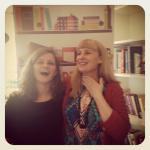
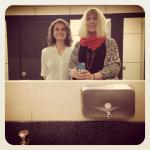
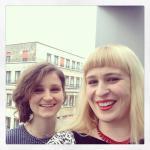
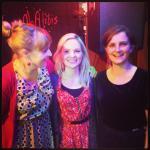
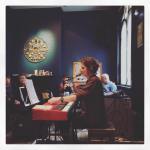
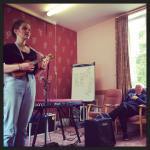
My lovely friend Hannah McPhillimy, (I’m still struggling to spell her second name right after four years of friendship- past attempts include McPhillimmy, McPhilmy, McPhilimmy and my personal favourite, McPhilliminy), is moving to America this week. I am very sad. It’s been quite the summer of precious people leaving and they’ve all left holes behind them. Big, slightly lonely holes. However, while Belfast might not be the same for the two years Hannah’s off in Michigan composing glorious new pieces of music, I have every faith that America will be greatly improved by her presence and, let’s face it, America could use all the help it can get right now.
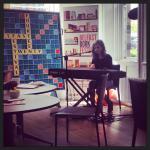
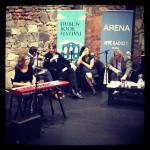
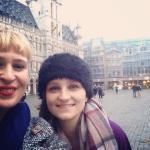
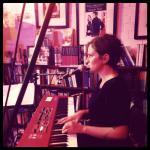


I’m a really lucky person. Over the last twenty odd years I’ve got to know and love a lot of incredibly talented, creative people. Sometimes I stand at the back of different pubs, venues and gathering places in Belfast and am literally astounded by the beautiful things my friends have managed to coerce out into the world. Stories. Poems. Pieces of theatre. Art installations. Films. Songs. You lot work magic in a wide range of genres but I have to say that when I’m standing there, dumbfounded at the back of a music venue, it’s usually Hannah McPhillimy who’s turned the room upside down. There’s something about Hannah’s voice which can take an entire room hostage. It’s not a demanding voice. It’s kind. It’s generous. It’s incredibly pure and gentle But it’s also powerful, and when coupled with the incredibly beautiful songs Hannah has been writing over the last few years, it has a holiness about it that cannot help but leave leave you marked by the encounter. Blessed. Refreshed. A little more easy in your own skin. Listening to Hannah sing is a little bit like a long, hot shower. I always feel cleaner afterwards. I am actually a little bit jealous of the people in America who haven’t heard Hannah sing yet. They don’t know what’s about to hit them.
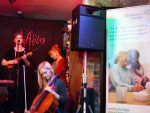
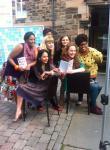
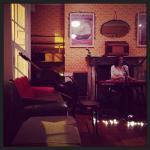
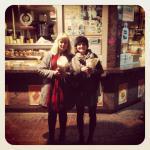
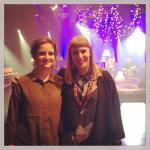

I’ve had the tremendous good fortune to collaborate with Hannah many times over the past few years. We’ve written songs and stories based on each others’ work, (Songs- Hannah, Stories-me, World- not quite ready for a reversal of these roles), and toured the results all over Europe, (when I say Europe, I mostly mean Northern Ireland, a couple of visits to Dublin and one quick jaunt to Belgium where we ate chocolate toast and couldn’t find waffles, and were driven about by a man in a tinted window limousine). We have had many adventures/mishaps/minor triumphs together. We have played old people’s homes, book shops, music festivals, book festivals, embassies, hotel conference suites and once, were even on the television together, looking more glam than we actually are in real life. We have spent more time than I’d care to mention hauling an enormous keyboard into the car, and out of the car, and up many, many flights of stairs in high heels. We have wired our own sound system, following quickly googled instructions off a mobile phone. We, (I), have accidentally driven up the Luas tracks into an oncoming train. We have repeatedly used the Ladies’ toilets in Applegreen’s as a makeshift changing room, occasionally asking other toilet users for a second opinion about our stage outfits. We have been mistaken for a mother and daughter act, (more than once). We have been heckled by old people because we do not know any Van Morrison covers and we have not provide tea at our gig. We have been photoshopped to within an inch of our life by the Arts Council photographer, (end result: Jan- skin of a Barbie, Hannah-face of Fearghal Sharkey). We have met a lot of lovely people we wouldn’t have met if we hadn’t formed an odd writer/singer-songwriter/cellist type girl band with Lizzy. In short we have had a complete blast.
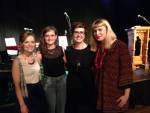
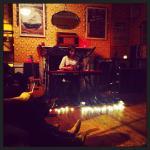
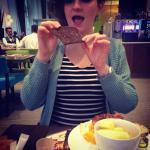

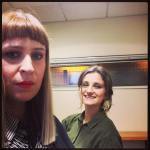

I am going to miss Hannah immensely. I am going to miss being creative with her, bouncing ideas of each other, talking up a series of unlikely-ever-to-come-to-fruition-but-nonetheless-inspiring storms over coffee, or wine, or long drives home from Dublin. I’m going to miss listening to her sing and I’m going to miss the way she is always there to listen to me and to encourage me and say the right, powerfully wise thing in the gentlest way possible. I’ve learnt so much from my friendship with her. There’s a song of Hannah’s which we all love. It’s called “Running” and it begins with the line, “In a living building there is room for you.” Over the years I’ve come to see Hannah as the human embodiment of this living building. She always has time for people. Not just the easy to like people, but all the broken, messed up, downright irritating people too. She is gracious and patient and sees the good in everyone. She makes people feel like they belong. She does this naturally, possibly even unconsciously, but I’ve noticed and I know many of you have too, and we are all grateful to have learnt, from Hannah, a little more about what it means to bring kindness into every situation you find yourself in. I am also grateful to have experienced this kindness myself, to have had the opportunity to feel at home with Hannah these last few years. I don’t believe this is the end of our adventures together.
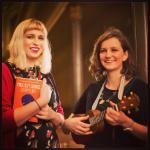

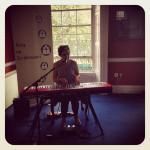
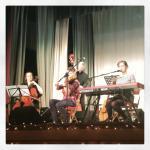

I have lately come to realise that you can make incredible art and be a truly horrible individual. It’s not as rare as you might think. There are a lot of people out there who don’t care about how they create art as long as it is successful. However, there is something about an artist of Hannah McPhillimy’s calibre imagining, producing, and performing art from such tremendous depths of character and integrity which makes her music that little bit more miraculous. Songs like hers, sung with a voice like hers, cannot fail to destroy people, in the very best way. So, Godspeed my dear friend. For selfish reasons I wish you were staying but I am so very proud of you for bravely pursuing excellence in everything you do and I am confident that this next period of learning will grow you immensely as both an artist and a human being. I have no doubt whatsoever that the next few years will challenge you and sometimes terrify you, that some aspects will fail to live up to your expectations and others will blow all those expectations out of the water. I hope your creativity flourishes. I hope you find honest and encouraging community. I hope you get to reach hundreds of thousands of people with your incredible songs. But most of all I hope you hold tightly to those remarkable, indefinable things which make you, you. You will be missed. You will be thought of often and fondly, while you are away from us.

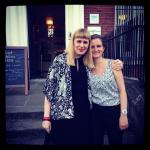
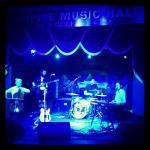


Hannah is hoping to record a debut album of her songs this year. If you’d like to help out financially you can check out her Go Fund Me page here.


August 13, 2017
Eastside Arts Festival 2017 (Thank You)
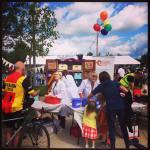





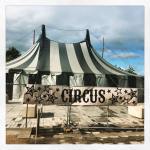
It’s Sunday evening. It’s 10pm. I’m sitting in my bedroom having a wee glass of wine and listening to the last bit of Ciaran Lavery’s gig come floating up the Greenway from CS Lewis Square. I have to say I could get used to appreciating live music from the pyjama-clad depths of my own bed. It’s the final night of the Eastside Arts Festival. I’m knackered. Everyone who’s been involved looks similarly knackered after ten fantastic days of running round the East like headless chickens, gigging and circus skilling and writing stories and reading stories and eating cake and pausing every three of four minutes to cover a different Van Morrison song with tremendous enthusiasm. I’m biased, (and lazy), and will always champion the arts festival that’s happening hundred yards from my front door, thus requiring zero effort to get involved. But still, what a festival it’s been.

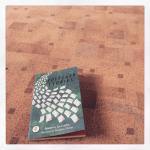


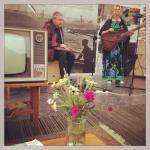

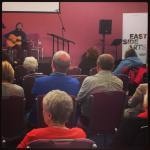

I’d be hard pushed to pick a highlight but if I had to select a few magic moments I’d definitely go for watching everyone get joyful to the Belfast Ukelele Jam at our Play It Again Jam last Sunday night, or maybe it was Anthony Toner being heckled by a randy older lady at one of our Highlights from Home gigs in an East Belfast Fold, or sitting in a TeePee, slowly boiling as I read the Tiger Who Came to Tea twenty seven times in a row to little people who live just down the road and up the road from me, or listening to people’s imagination come out to play during the Postcard Stories workshop, or watching -literally- hundreds of locals line up at our Pop-Up Pharmacy to receive a kindness prescription, created by their neighbours, or it might have been hearing Hannah McPhillimy raise her beautiful voice and soothe an entire room of distressed older people living with advanced Dementia, or one of the incredible, haunting concerts in the gorgeous surrounds of St Martins Church, or seeing a whole alleyway bloom with brand new street art, or bringing beautiful words, music, flowers and cake together with a bunch of people I love for a sneaky wee gig on the roof of the Skainos Centre. Nope, I definitely couldn’t pick a single highlight. This year’s Eastside has been a blast from start to finish. I’ve enjoyed every second of it, but it isn’t the art which makes this festival magic, and it certainly isn’t the enormous budget, (though if anyone out there does have an enormous budget they’d like to pass on, I’m sure the team can think of something wonderful to do with it). Eastside is a festival which works because people are right at the heart of it.

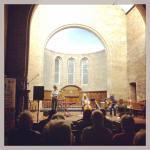

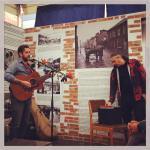
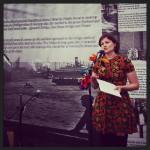



Running through every event Rachel and Jacqui have put together this year, is the implicit understanding that everyone is invited to the party. With fun days in the Square, another jam-packed set of nursing home gigs and performances and an incredible team of volunteers and staff members who excel at making people feel welcome, the team have down their best to ensure everyone is included. I’ve met so many people this week who normally find themselves on the margins of these kind of events and have been made to feel like they not only belong here, but have something important to contribute to our community. I’ll not go into details but every single day this week, I’ve met different people who are really eager for connection, and watched them meeting others, trying new experiences and beginning to realise that there’s a place here for them. I’m a little sappy but last Saturday afternoon, seeing CS Lewis Square jammed with happy local residents, little kids, families, older people, artists, folks from up the road and down the road and all over the East, really made me realise how far we’ve come in such a short period of time and just how much potential there is here in the East. Festivals are great but I honestly don’t think there are very many festivals in Belfast, which aide and encourage ongoing community development as much as the Eastside Arts Festival has over the last few years.

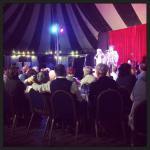
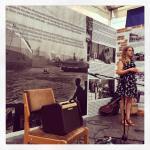

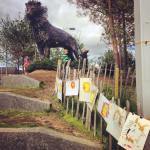



The events aren’t always the sleekest: my reading tent had a bockety felt tip sign, handmade by my seven year old niece and I’ve lost track of how many times I, or one of my performers, has had to pause mid sentence to make way for a Ryanair flight, thundering overhead en route to the City Airport. I’ve found myself winging it at most events I’ve looked after this week, and even ran an extension cord half way round a building in search of a power socket to plug the band in.Whilst the art this year has been of an incredibly high standard, there’s a fair amount of homeliness about this festival too. Let’s just say I’ve eaten a lot of cocktail sausages and custard creams this week and sung along to Brown-Eyed Girl more times than I’d care to mention. And that’s ok, because it keeps things accessible. I’ve long since bored everyone to tears going on about how our arts offer, (output? experience? gah, I can’t really think of a word that doesn’t sound like it’s been lifted from the Tourism and Arts Strategy), here in Belfast needs to maintain a high level of quality without compromising on the thing we do better than anywhere else in the world, which is welcome.





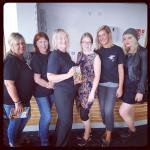
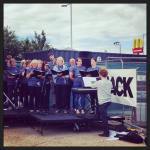
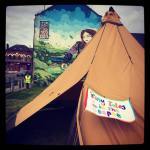
This week Eastside Arts has been an incredible example of what can happen when good art is delivered with an incredible emphasis on welcome, not to mention heart and humility. It’s not rocket science folks. You put a marvellous show on and you make sure there’s nothing stopping people from joining in. So, hats off to the volunteers and staff at Eastside Arts, to Rachel and Jacqui, to Matt McIvor on constant sound, to all the performers and creators and providers of coffee and cocktail sausages and tireless welcome, to the nursing homes who let us in and the nursing homes who came out to see us, to everyone who came early and stayed late to tidy up, to everyone who went out of their way to make an older person feel noticed this week, (you have a special little place in my affection), to those who said encouraging things and those who said, “it would be remiss of me not to play a wee Van cover,” and those who took the time to get to know somebody they didn’t know last week, to those who brought cake which was way better than the cake we were expecting and those who brought flowers without being asked to bring flowers, you’ve all been a tonic. But mostly I want to raise a Sunday night glass of cheap Rioja to those who shook their cynicism off and let themselves think it could actually be like this all the time. Rest well. There are further adventures to come.



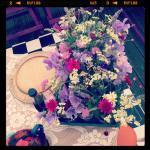


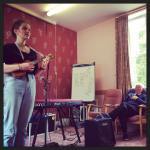


August 10, 2017
Talented Friends – Bernie McGill
[image error]
I’m a big fan of Bernie McGill. I love her writing. The Butterfly Cabinet was one of the first Northern Irish books I read after moving back home from the States. I have a really clear memory of finishing this beautiful novel and thinking, this isn’t just good by local standards, it’s actually, properly marvellous. I was particularly taken by the way Bernie managed to seamlessly weave carefully researched historical detail through a rollicking good plot and still leave room for beautiful, meandering descriptions, exquisitely drawn characters and that wonderful local dialogue she has such an ear for. What a read. The Butterfly Cabinet quickly became one of those books I keep on my surefire birthday present buying list, i.e. the kind of book you’d have to be an absolute idiot/some sort of deviant human being, not to love. (Stop me if you want to know which other books are on there).
Next, Bernie gave us the devastatingly, wonderful short story collection, Sleepwalkers. We all squashed our way on to the Belfast Barge to launch it in style; so many hot and sweaty bookish folk, there was a moment, halfway through the evening, when it seemed likely the barge was heading for the bottom of the Lagan. That evening has always stuck in my head as one of the moments I first became aware something strange and marvellous was beginning to happen in Northern Ireland’s literary community and that there were exciting times ahead for all of us. Sleepwalkers is a delight to read. It is the kind of book which sinks its teeth into you and comes slipping back into mind, in frames and segments at the oddest times. The stories occasionally flirt with the fantastical, are always written with a kind, but unswerving, eye for the best and worst in human beings and, unsurprisingly appeal to a person who falls heavily on the realist side of Magic Realism.
I have just finished reading Bernie’s latest book, The Watch House. I took it with me to Spain and read it in one very hot afternoon, propped up beneath a palm tree on the beach. I found it impossible to put down. I actually think I might have Bernie to blame for the fact that I sunburnt both my shins in the process. What a strange and captivating wee book The Watch House is. It is so very definitely grounded in the geography and culture of Rathlin Island. At times you can really feel the claustrophobic crush of island living. The deftly woven folklore and myth, the beautiful descriptions of the rugged, coastal landscape, the dialogue so perfectly attuned to the North Antrim lilt, and Nuala, the novel’s chief narrator, who is both a woman of her times -constrained by rural life and circumstance- and a kind of modern heroine, pursuing happiness in spite of a dire situation. I loved the familiarity of this story. It felt like reading a little bit of my own history. I know these landscapes. I’ve heard these stories and the way of telling them. I can picture the scenes and scenarios Bernie describes even though I grew up almost a hundred years after the period in which The Watch House is set. It is an odd and somewhat unsettling experience to find yourself reading a book, beneath a palm tree in tropical conditions, while in your head you are miles away, shivering on the Rathlin to Ballycastle ferry.
So much of The Watch House‘s success hinges on the historical detail Bernie has employed consistently throughout the novel. You can see where she’s spent hours of careful research discovering all the details necessary to make her story believable, and yet it never feels preachy or bogged down in unnecessary facts. I loved the backstory of Marconi’s scientific experiments. There is a kind of magic about the idea of sending sound messages across the sea which sits really comfortably beside the old island magic of myth and religion. Mention of Marconi’s work also helped to frame the smaller, more familial story, within the context of the wider world. I often forget, when reading historical novels and stories, set in one particular locale, to consider what is happening elsewhere in the world at this point in history. Bernie does this with extreme skill throughout The Watch House.
At the beginning of this blog, I said I was a Bernie McGill fan. I’m not just a fan of Bernie’s work. I’m a massive fan of Bernie the person as well. In her own quiet, understated way, Bernie has encouraged me many times over the years: conversations, coffees, chance encounters at literary events. She’s delivered wise words softly, and always with a twinkle in her eye. It’s taken me three books to realise that Bernie has a very similar approach to writing. I remain a tremendous fan and am glad to have another book to put on my surefire birthday present buying list.
You can catch Bernie McGill at a literary event near you at some stage in the next few months, details below:-
Flowerfield Arts Centre, Portstewart
Thursday 21st September 2017 at 7pm
Launch of The Watch House in conversation with Eimear O’Callaghan, author of Belfast Days: A 1972 Teenage Diary
In association with the John Hewitt Society
Admission Free but please reserve a place by phoning 028 7083 1400 or email reception@flowerfield.org
North Down Museum, Bangor
Sunday 24th September 2017 at 3pm
Reading from The Watch House with David Park, author of The Truth Commissioner and The Poets’ Wives, introduced by writer and broadcaster Malachi O’Doherty
An Aspects Festival event. Booking details here: http://aspectsfestival.com
No Alibis Bookshop, Botanic Avenue, Belfast
Tuesday 17th October 2017 at 6pm
Reading from The Watch House, in conversation with Jan Carson, author of Malcolm Orange Disappears and Children’s Children
A Belfast International Festival event. Full programme details to be announced: https://belfastinternationalartsfestival.com


August 5, 2017
Postcard Stories from Spain – July/August 2017



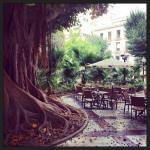
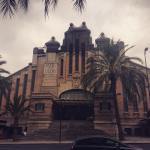
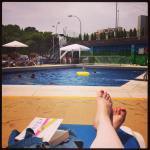
28th July 2017
Alicante
Jason O’Rourke
The Spanish eat late and we are, for one week only, living in Spain and, despite our milk bottle legs and pasty faces, making every attempt to fit in. We are drinking Sangria. We are talking loudly, and with some swagger, in the street. We are trying to tan. We are even occasionally saying Hola, in lieu of Hello, and Gracias instead of Thank You, though our pronunciation is still East Belfast sharp and to the man in the corner Bodega must sound more like Grassy Ass, than any form of authentic gratitude. Nevertheless we are doing our best to appear Spanish. Eating late. On a boulevard. Wearing flip flops to the table. All the time wondering what our delicate Northern stomachs will make of so much pasta, so late at night.
We are trying to get the waiter’s attention as he passes us for the fifth and sixth time. We are using well-practiced, beckoning gestures, similar to how you might gesticulate at a runaway toddler. However, we are having no luck. We appear to be invisible to this waiter and all his black-shirted colleagues. We have without realizing, achieved the state of ‘fitting in’ and passed smoothly into some other, more Continental state, where we are indistinguishable from the furniture.
29th July 2017
Alicante
Seonaid Murray
The first girl said, “shall we have a wee nap before we head out tonight?”
The second girl, who was the more cautious of the two, and well aware that it was already gone seven, an hour more normally associated with heading home for the night, said, “ok, but only a very quick nap.”
Somewhat enamoured with the idea of a late afternoon Siesta and all its Continental associations, both girls failed to set the alarm function on their mobile phones and consequently slept through eight o’clock, nine o’clock, (which was the exit hour they’d been roughly aiming themselves at), ten and eleven o’clock, to wake at midnight, which was much too late for heading out, even in a cosmopolitan Spanish resort. And so they stayed in and dined richly on strawberry yoghurt, and jarred olives and half a bottle of Spanish red, consumed neat from a toothbrush mug, before falling back to sleep for fifty years/three weeks/four hundred days or some other fairytale-ish amount of time. Long enough to sleep the dull dreams out, and the Belfast drizzle, and the drag, not to mention the pigeon gray hue of long wintered skin, and all those serious thoughts. Long enough to wake with a head like a just-planted seed, already beginning to sprout.
30th July 2017
Alicante
Bob Johnston
They are a pair. Like salt and pepper. Or Torville and Dean. Or Carol Vorderman and that man who used to present Countdown on Channel Four. They are most definitely meant to be together. They just don’t know it yet.
You spot her first, sitting alone at the beachside café where you are always served vanilla ice cream, no matter what you order in faltering GCSE Spanish. She is about your age, pale, limp-haired and reading a paperback novel half-heartedly as she sips her café con leche. She is very obviously lonely.
You spot him less than an hour later, also alone, and tubby in a Homer Simpson t-shirt, making short work of a Magnum Classic. A sliver of chocolate has broken free and melted into the white of his shirt. It will probably leave a stain. There is no way of knowing for certain but you’re pretty sure his name must be Roy or Gary. Something from an early 90s sitcom.
You want to draw a line between this woman and man. You want to say, “does your loneliness not feel even keener when pitched against all this sunshine?” You want to kick the well-meaning friends who said, “take a holiday by yourself. It’ll be character-building. You might even meet someone.” Yes, you want to draw a great, big, sloppy line of romance between this man and woman and in doing so wipe that smuggish look off the faces of all those well-meaning friends.
31st July 2017
Alicante
Caroline Magennis
There is an elderly French man living in the hotel lift. I encounter him every time I leave our room on the fifth floor. He is always in the lift waiting patiently by the push buttons every time I return. I am reasonably certain he is not a Bell Hop for this is neither the 1930s nor a hotel luxurious enough to require the services of a Bell Hop. He is wearing Bermuda shorts and a washed out holiday t-shirt, a Majorcan sunset stretching across his great drum of a belly.
One morning the man is eating breakfast cereal from a bow, the next dozing on the floor, and that evening, leaning against the back wall of the lift, scanning the day’s paper. He has the weary look of a man who does not know where he will lay his head tonight.
“Do you live here in this lift?” I ask him in very plain English.
He says something, rapidly in French, which I take for “yes” and smile sympathetically, all the time wondering if it would be considered inappropriate to offer this elderly stranger our hotel room balcony, or the thin space between our beds with a rolled up towel for a makeshift pillow.
Later, as I fall asleep, I will wonder if the Frenchman who lives in our lift dreams differently from us ordinary folk, currently sleeping in static positions. Do his dream thoughts slide up and down, temporarily catching on one floor or the other, like a bored teenager, flicking between television channels?
1st August 2017
Alicante
Nicky Bull
This afternoon it rains. It is almost thirty five degrees out and whilst the sky is not the same baby eye blue it has been all weekend, it is still a summery enough sort of shade. No one is expecting rain. The first drop lands on you arm as you walk along the palm-lined boulevard, past the marina and the African woman squatting on camp stools to braid tight cornrows into the salmon pink scalps of young girls from Glasgow and Bristol. They are not expecting rain either. Their mouths make neat little o’s and squeak shrilly. It is impossible to tell whether it is the rain which has shocked them, or the persistent sting of so much tugging at sunburnt skin. The Moroccan man standing next to the fountain, selling helium-filled balloons of Peppa Pig is not expecting rain either. The beach police, cycling up and down the promenade in spandex cut-offs couldn’t possibly have known. The heavens open. You haven’t so much as an anorak hood to keep the fat drops off. You weren’t expecting rain. The weather ap on your phone still says smiley sun, smiley sun, smiley sun, every day for at least a week. How could you have known to pack an umbrella? You shelter under a largish palm tree and remember how, innocent of all the Met office’s shenanigans, you once believed television weathermen blessed with a sixth sense when it came to rain and shine predictions. You had Michael Fish down as a kind of weather prophet. You had no idea that such a thing as a teleprompter even existed. Later, when you discovered the forecast was science rather than magic, you’d lost all interest in the weather.
2nd August 2017
Alicante
Christine Morrow
We are staying in the sort of hotel which offers nightly entertainment. Water fights, junior discos and egg painting for the smaller residents. Champagne bingo, (?), music disco and World of Warcraft tournaments for those allowed to stay up after eleven. Tonight it is Elvis impersonator night at the poolside bar and though neither of us are particular big Elvis fans, we have a feeling that this evening will offer just the right mix of class and kitsch, to give us an authentic package holiday experience. We are hoping Elvis will be just the right amount of awful. We are dressing up in anticipation, using enormous amounts of hairspray to fashion makeshift quiffs from our sun-frizzed hair, ad libbing Vegas era jumpsuits from linen trouser and shirts with upturned collars. Wearing all our rings at one time on the same hand. We practice Elvis lip curls in the lift. We affect a Southern drawl. We are the only people in the poolside bar dressed like Elvis. The entertainer is not even dressed like Elvis. Nor is he singing Elvis tunes. “That’s a really shit Elvis impersonator,” we say to the barman, and he says, “Elvis night’s tomorrow night. That one’s doing Fleetwood Mac.” We order gin and tonics. We flatten our quiffs. We remove most of our rings, stealthily, beneath the table and try to look like we are wearing our normal going out clothes. We do not say the word Elvis for fear of being overheard and seeming ridiculous.
3rd August 2017
Alicante
Andy and Holly Eaton
Between 1949 and 1953, the Alicante born artist Eusebio Sempre lived and worked in Paris, France. He would later come to see these years as a period marked by silence and self-discovery. By day he worked, earning just enough money for food and lodgings. By night he sat at his desk tracing hundreds and thousands of straight, interlocking lines in gouache. He’d use earth tones and the occasional iridescent blue to render the idea of kinetic possibility on a black, cardboard background. Sometimes he grouped his lines into triangles. Sometimes squares. Never circles. He was not a frivolous man. Silence was everything, and the simplicity of an unflinchingly straight line. Over the years, these lines became thinner until all the punch of Sempre’s work lay in the dark space between one line and the next. It is not difficult to read this space as silence. To look at it and feel a kind of stillness behind the eyes. Nor is it difficult to believe that some years after his death, two unnamed physicists, discussing Sempre’s linear aluminium sculptures, over cold beers in some unnamed Spanish bar, would realise that his carefully rendered beams could interrupt sound waves, could pitch the surrounding space into silence. This, they would conclude, was the sort of thing Sempre had been after all along.
4th August 2017
Alicante
Anne and Chloe Thwaites
Tonight is our last night in Spain. We are eating pizza outside the little Italian restaurant next to our hotel. We like the fairy lights here, the Rioja, and the pleasant-faced waiters. It is almost eleven but the heat has yet to go out of the day. We press our thighs against the underside of the table hoping the cold formica will ease our sunburnt legs. We try not to think about the drizzle awaiting us in Belfast.
“There’s something ludicrous about having sunburn when it’s raining,” you say, “it’s like your body hasn’t quite caught up with itself.”
I wonder how long it will take before the paleness comes creeping back up over my shoulders and down my back. I wonder if I will peel. For a while we do not talk. We eat pizza and drink wine and watch a Spanish grandpa walk slow laps of the square, pushing his granddaughter in a collapsible buggy. It is almost midnight now yet the child has no notion of sleep. By the fifth circuit the grandpa looks exhausted. His granddaughter is bright-eyed and babbling, bending like a door hinge to suck on her little pink toes. She is fighting sleep and winning. She is refusing to let a good day end. We look at this small, squirming creature and we wish we had her pith. Tomorrow we will leave this place and return to our ordinary ways and we are not even trying to resist.



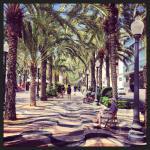




July 28, 2017
John Hewitt Summer School 2017
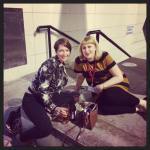

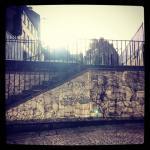


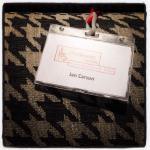
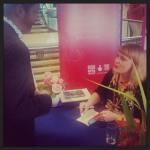
Another week, another book festival. Another twelve hour stopover in my own house. Another frantic scramble to find enough clean socks to make it through ’til Friday. Another futile attempt to coerce my plants back to life with a half-hearted weekly water. Another scenic run up the M1. Another attempt to pre-think exactly which short story collections I will want to refer to in my workshops which inevitably ends in brain muddle and the decision to just bring all the books in the world with me anyway. Inevitably I will cart all the books in the world about in Tesco bags for life, (bag for lives?), for the duration of the week, putting my shoulder out and never once referring to any of them, all the time quietly confident that if a question about Bridget Jones’ Diary or Faulkner or The Da Vinci Code were to come up, I’d be fully equipped to answer, quoting directly from the text.


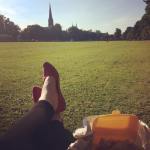
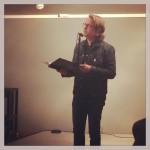
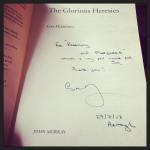
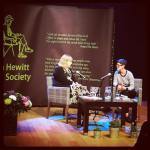
After three weeks on the road I am beginning to run out of Book Festival steam. I have forgotten what it is to be quiet. I am making the assumption that everyone I come across, (shop assistants, baristas, people trying to have a peaceful pint of a Thursday afternoon), are also attending a book festival and that it would be rude not to at least try to draw them into conversation about Colm Toibin or poetic form. My throat feels broken from talking about books and I am glad to be heading off to Spain this afternoon to lie by the pool for a week and not have to talk about authorial responsibility, or writing practice or the bloody DUP coalition. I am tired, but it is a good kind of tired, the sort of tired you are the morning after a stupendously enjoyable dinner party, and I’m very thankful for all the fantastic, encouraging and downright weird experiences of the last few weeks. I am particularly glad that I managed to keep a little energy on hold for the John Hewitt Summer School because it is my secret favourite.
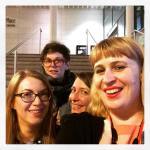
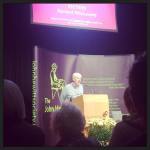
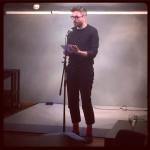


The John Hewitt Summer School was 30 years old this year and I don’t think I’m alone in saying it was easily the biggest, the best and the most enjoyable summer school yet. I could talk at length about how amazing the Wednesday morning poetry reading with Luke Kennard and Malika Booker was. I could wax lyrical about the sheer loveliness of being interviewed by the legend that is Peggy Hughes or discussed in a lecture by the powerhouse that is Caroline Magennis. I could enthuse about chats with Lisa McInerney, both on stage and off stage and boast about the fact that I finally beat Stephen Sexton at pool in the parrot bar. I could say fabulous things about the John Hewitt Committee, their tremendous hospitality, their friendship and encouragement over so many years, their constant endeavours to ensure the JHSS extends a welcome to a huge crowd of very different people and manages to foster real, deep community in a very short time frame. I could put Hilary Copeland on a big pedestal and say, with great pride, not only is this woman one of my dearest friends, but man, does she run a tight ship when it comes to book festivaling. I could say, once again, aren’t we all lucky to have David Torrance and Damian Smyth and Paul Maddern and the Bleakneys and Maureen and Malachy, and a bunch of other wise and wonderful souls on hand to offer insight, encouragement and the odd, well-timed piss take. I could talk about the tremendous fun I had teaching a short story workshop with a bunch of very talented beginner writers. I could even say many enthusiastic things about the tea and mammoth jammy scones which form the bedrock of any John Hewitt Society event.
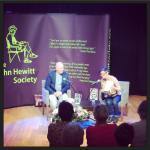

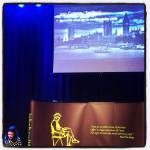
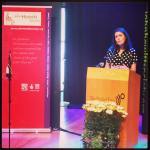

But, I’ll not say any of this. I’ll just say that coming to the John Hewitt Summer School is like coming home for me. It’s good to gallivant all over the place but it’s only good if you have a home to come back to and if this week taught me anything, it was the importance of having book family to return to, and what a marvellous, eclectic, talented, encouraging and incredibly supportive family it is. I am a very lucky writer. Off to unpack the suitcase and hit the road again, (Hums the theme tune of The Littlest Hobo/wonders if it’s ok to turn socks inside out and get a second wear out of them).
